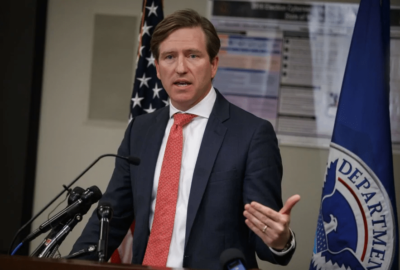

The D.C. area's senate delegation is taking an interest in cybersecurity beneath the city's streets.
Returning federal employees must re-acclimate themselves to the joys of the D.C. Metro. Now that the City Council has lightened up on turnstile jumping, lithe feds might try it to save money.
Now the great national issue of cybersecurity has blended like a fused rail to the issue of new Metro cars. The four senators representing Maryland and Virginia are concerned about the potential Chinese origin of the spiffy new 8000 series cars. Bids on Metro’s RFP are due Thursday.
Chinese rolling stock manufacturing matches the best of what’s out there. Metro hasn’t yet picked a new supplier. The agency wants to retire the last of its earlier generation cars. It can’t happen too soon. I’ve always wondered about the genius who thought carpeting in a subway car was a good idea.
The senators expressed a legitimate worry: New cars are full of electronic controls. They also have video surveillance. Occasionally you do see someone famous and powerful on the Metro. Spotted by facial recognition, a person’s mug could be diverted right to Xi Jinping. “Aha! Deputy Secretary So-and-So is getting off at Farragut West, they’re going to talk to the Washington Post! Activate our newsroom mics!”
More fundamentally, the senators implied, should billions of dollars of taxpayer money go to Chinese industry? The senators said China has “explicitly sought to undermine our country’s economic competitiveness and national security.” Such a procurement couldn’t happen under federal rules.
No company in the United States builds transit cars any more, so the money will flow out regardless. Manufacturers exist in European countries and Japan. I don’t want to get into the weeds here but I came across this 2017 story in which the Chinese manufacturer had planned to build an assembly plant in upstate New York.
Metro operates under neither the Federal Acquisition Regulation nor the Defense FAR. The senators don’t imply that it should. Their concern is the potential for trouble from an electronically-enabled entity built in China running beneath the streets of the nation’s capital, and under the National Institutes of Health or the Pentagon, for that matter. Terrorism in subways has occurred elsewhere. It would be foolish to think it couldn’t happen on Metro.

Here’s a possible solution: If the Chinese are willing to do assembly in the U.S., press them on it. Metro will be buying at least 256 of these cars. There must be some economically depressed areas in Virginia or Maryland where cars could undergo final assembly.
Then subcontract the electronics, including the software, to a U.S. company. That could potentially bring small business into the acquisition. Who knows, Metro cars could even, miraculously, acquire good WiFi.
The danger is that the Metro car acquisition devolves into a Pentagon-style platform buy. To appease the political gods, each piece has hundreds of subs spread out all over. Complexity, costs and schedules balloon. The last thing Metro needs is the F-35 of railcars.
Copyright © 2024 Federal News Network. All rights reserved. This website is not intended for users located within the European Economic Area.
Tom Temin is host of the Federal Drive and has been providing insight on federal technology and management issues for more than 30 years.
Follow @tteminWFED
